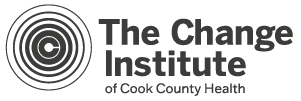Since announcing The Change Institute of Cook County Health, one of our immediate priorities has been to create a structure to enhance and expand our service lines in three key areas where we too often see patients presenting with late-stage disease: cardiology, neurology, and oncology. We are pleased to announce the appointments of three new interim leaders tasked with spearheading initiatives that will improve patient outcomes in their respective area of expertise.

As interim Director of the Cardiovascular Service Line Project, Dr. Rami Doukky will lead the effort to bring cardiology, cardiothoracic surgery, vascular surgery, rehabilitative medicine, physical therapy, and radiology together to meet the needs of our patients. Expanding non-invasive procedures in the Catheterization and EP labs is already underway.

Dr. Lakshmi Warrior will serve as interim Director of the Neuroscience Service Line Project, charged with developing a multidisciplinary program that more closely unites neurology, neurosurgery, psychiatry, rehabilitative medicine, physical therapy, and radiology. Building neuroscience capacity to perform more complex surgical procedures will provide our patients with integrated state-of-the-art care.

For the Cancer Center Service Line Project, Dr. Urgeet Patel has been named interim Director and will lead in providing a comprehensive continuum of cancer care for our patients. Under Dr. Patel’s leadership, the Cancer Center will bring together Medical and Radiation Oncology, Surgery, Pathology, Genetic Counseling, Infusion Center, Diagnostic Radiology, Nuclear Medicine, Psychosocial Services, and Palliative Care to provide integrated care for the communities we serve.
Please join me in congratulating Drs. Doukky, Warrior and Patel. We look forward to sharing updates about their work to address health equity and improve patient outcomes in the coming months.
Sincerely,

Israel Rocha Jr., CEO
Cook County Health
Featured News

Health disparities and COVID-19
We are proud that three of our physicians were lead authors in this recent journal article, which builds upon our efforts to identify and quantify areas of stark inequality in order to develop scientifically based interventions.
We hope that the lessons from this study can help illuminate the persistent inequalities in our country so that, as a society, we can better address these issues. As we confront the subsequent waves of this disease and work to vaccinate as many people, as quickly as possible, we must acknowledge who within our society suffers the most and find ways to focus our efforts to keep those populations as safe and healthy as possible.
Related News

Black Americans’ Views of and Engagement with Science
A new Pew Research Center survey takes a wide-ranging look at Black Americans’ views and experiences with science, spanning medical and health care settings, educational settings, and as consumers of science-related news and information in daily life.

Asian Americans and Heart Disease Risk: Why One Size Does Not Fit All
Asian American people are typically categorized simply as “Asian” for the purposes of health research and reporting. It’s a simplification that doesn’t expose their true diversity. A new retrospective study finds that some Asian American subgroups are at particular risk for ischemic heart disease, heart failure, and cerebrovascular disease.

Pfizer Launches ‘An Accord for a Healthier World’ to Improve Health Equity for 1.2 Billion People Living in 45 Lower-Income Countries
Pfizer launched ‘An Accord for a Healthier World’ to provide all of Pfizer’s medicines and vaccines on a not-for-profit basis to 1.2 billion people in 45 lower-income countries.


